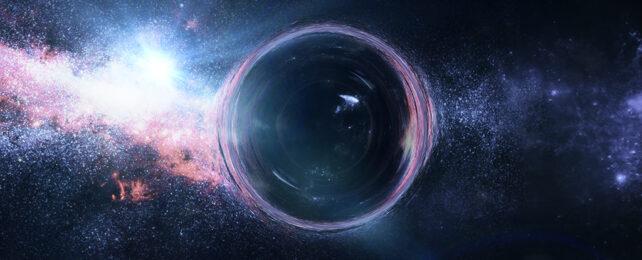 (dottedhippo/Getty Images)
(dottedhippo/Getty Images)
Nearly a century has passed since scientists broke the Universe.
Last year, a small group of physicists from the University of Chicago argued the mere presence of a black hole somewhere nearby tugs at the strings of a mass in a blur of quantum states and forces it to pick a single fate.
Now they've returned with a follow-up prediction, presenting their views on different kinds of horizons, in a pre-print ahead of peer review.
Imagine a small piece of matter emerging out of the darkness inside a closed box.
Unseen, it exists in a blur of maybes. It has no single location in the shadows, no particular spin, no specific momentum. Importantly, any light it emits also lies on an infinite spectrum of possibility.
This particle hums with potential in a wave that theoretically spreads into infinity. It's possible to compare this spectrum of possibilities against itself in the same way a wave on the surface of a pond can split and recombine to form a recognizable pattern of interference, in fact.
A physicist who peeks inside the box to detect the light emitted by the particle will inevitably entangle themselves and their environment with the hidden particle's waves, causing some degree of decoherence.
But what if there was a second person looking over their shoulder, catching the light emitted by the particle with their own eyes? Likewise, by entangling themselves with the light emitted by the particle, they would further constrain those possibilities in the particle's wave, changing it further still.
And if the second observer was standing on a distant planet, light-years away, peering at the box through a telescope? Here's where it gets weird.
In spite of the years, it took for the electromagnetic ripples of light to travel out of the box, the second observer would still entangle with the particle. According to quantum theory, this should also cause a noticeable change in the particle's wave, one the first observer would see long before their colleague on a distant world even began to set up their telescope.
Or, according to Danielson, Satishchandran, and Wald, our second observer is irrelevant. That line-of-no-return that encircles a black hole, known as the event horizon, serves as an observer itself, eventually causing the decoherence of, well, just about everything. Like a crowd of giant eyes across the cosmos, watching the Universe unfold.
Creeped out yet? It only gets worse.
Black holes aren't the only phenomena where space-time stretches into a one-way-street. Any sufficiently-accelerating object approaching the speed of light, in fact, will eventually experience a horizon of sorts from which information it emits can't ever possibly return.
According to the trio's most recent study, these 'Rindler horizons' could also produce a similar kind of decoherence in quantum states.
This isn't to say the Universe is in any way conscious. On the contrary, the conclusions could lead to objective theories on how quantum states resolve into absolute measurements, and perhaps where gravity and quantum physics meet in a single overarching theory of physics.
The Universe is still broken, for the time being at least.
All we can say is watch this space.
This research was published in arXiv.









0 Comments